
The Pittsburgh Pirates are an American professional baseball team based in Pittsburgh. The Pirates compete in Major League Baseball (MLB) as a member club of the National League (NL) Central Division. Founded as part of the American Association in 1881 under the name Pittsburgh Alleghenys, the club joined the National League in 1887 and was a member of the National League East from 1969 through 1993. The Pirates have won five World Series championships, nine National League pennants, nine National League East division titles and made three appearances in the Wild Card Game.

Johannes Peter "Honus" Wagner, was an American baseball shortstop who played 21 seasons in Major League Baseball (MLB) from 1897 to 1917, mostly with the Pittsburgh Pirates. Nicknamed "the Flying Dutchman" due to his superb speed and German heritage, Wagner was a prototypical five-tool player, known for being a versatile defender who could combine a strong throwing arm with the ability to play almost any defensive position as well as being capable of hitting for average and for power. He is widely regarded as the greatest shortstop of all time. In 1936, the Baseball Hall of Fame inducted Wagner as one of the first five members.
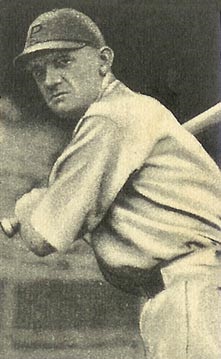
Maximillian George Carnarius, also known as Max George Carey, was an American professional baseball center fielder and manager. Carey played in Major League Baseball for the Pittsburgh Pirates from 1910 through 1926 and for the Brooklyn Robins from 1926 through 1929. He managed the Brooklyn Dodgers in 1932 and 1933.

Fred Clifford Clarke was an American Major League Baseball player from 1894 to 1915 and manager from 1897 to 1915. Clarke played for and managed both the Louisville Colonels and Pittsburgh Pirates. He was a left fielder and left-handed batter.

Exposition Park was the name given to three historic stadiums, located in what is today Pittsburgh, Pennsylvania. The fields were used mainly for professional baseball and American football from c. 1879 to c. 1915. The ballparks were initially located on the north side of the Allegheny River in Allegheny City, Pennsylvania. The city was annexed into Pittsburgh in 1907, which became the city's North Side, located across from Pittsburgh's downtown area. Due to flooding from the nearby Allegheny River, the three stadiums' exact locations varied somewhat. The final version of the ballpark was between the eventual sites of Three Rivers Stadium and PNC Park.

William Boyd McKechnie was an American professional baseball player, manager and coach. He played in Major League Baseball as a third baseman during the dead-ball era. McKechnie was the first manager to win World Series titles with two teams, and remains one of only three managers to win pennants with three teams, also capturing the National League title in 1928 with the St. Louis Cardinals. His 1,892 career victories ranked fourth in major league history when he ended his managing career in 1946, and trailed only John McGraw's NL total of 2,669 in league history. He was nicknamed "Deacon" because he sang in his church choir and generally lived a quiet life.
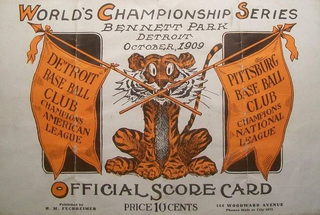
The 1909 World Series was the championship series in Major League Baseball for the 1909 season. The sixth edition of the World Series, it featured the National League champion Pittsburgh Pirates against the American League champion Detroit Tigers. The Pirates won the Series in seven games to capture their first championship of the modern Major League Baseball era and the second championship in the club's history. This Series is best remembered for featuring two of the very best players of the time, Pittsburgh shortstop Honus Wagner, and Detroit outfielder Ty Cobb.
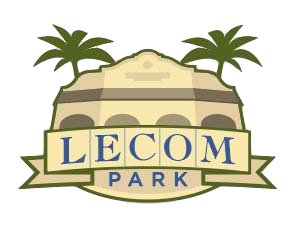
LECOM Park is a baseball field located in Bradenton, Florida. It is the spring training home of the Pittsburgh Pirates and is named after a 15-year naming rights deal was signed with the Lake Erie College of Osteopathic Medicine, which has its main campus in Erie, Pennsylvania, and also a campus in Bradenton. It was formerly known as McKechnie Field, named for Bradenton resident and Baseball Hall of Fame great Bill McKechnie, who led the Pirates in 1925 and the Cincinnati Reds in 1940 to World Series titles. He was also a coach with the Cleveland Indians in 1948.
The Pittsburgh Rebels were a baseball club based in Pittsburgh, Pennsylvania, from 1913 to 1915. The team was a member of the short-lived Federal League. The team was originally called the Pittsburgh Stogies after an earlier Pittsburgh team that played in the Union Association in 1884, but became known as the Rebels by the end of the 1914 season. The team played all of its home games at Exposition Park, located on Pittsburgh's Northside. The Pittsburgh Pirates of the National League left the stadium for Forbes Field in 1909. After the Rebels left Exposition Park in 1915, the field was demolished and its property became part of the adjacent rail yards.
The following are the baseball events of the year 1940 throughout the world.
The Middle Atlantic League was a lower-level circuit in American minor league baseball that played during the second quarter of the 20th century.
Robert Nutting is an American businessman and sports team owner. Since 2007, he has been the principal owner and chairman of the board of the Pittsburgh Pirates of Major League Baseball. His other business activities include serving as president & CEO of Ogden Newspapers Inc. He is also the former chairman of Seven Springs Mountain Resort, Hidden Valley Resort, and Laurel Mountain Ski Area, which he sold to Vail Resorts in December 2021 in a $118 million deal.
The 1938 Cincinnati Reds season was a season in American baseball. The team finished fourth in the National League with a record of 82–68, 6 games behind the Chicago Cubs.

The Bradenton Marauders are a Minor League Baseball team of the Florida State League and the Single-A affiliate of the Pittsburgh Pirates. They are located in Bradenton, Florida, and play their home games at LECOM Park, which also serves as the Pirates' spring training facility.
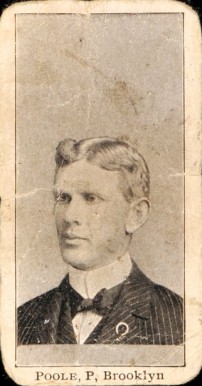
Edward Isaih Poole was a pitcher in Major League Baseball. He played from 1900 to 1904 with the Pittsburgh Pirates, Cincinnati Reds, and Brooklyn Superbas. Poole stood at 5 ft 10 in (1.78 m) and weighed 175 lbs.
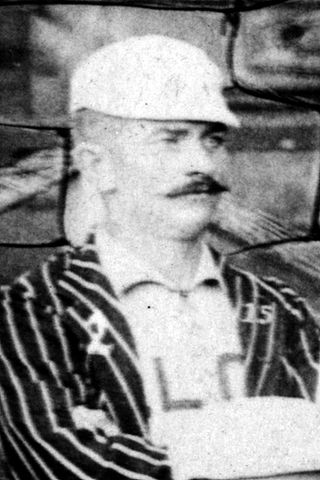
William Dighton White was an American professional baseball player who was mainly a shortstop in the Major Leagues for nine seasons from 1879 to 1888. During his Major League career, he played for three different franchises: the Pittsburgh Alleghenys in 1884, the Louisville Colonels from 1886 to 1888, and the St. Louis Browns, also in 1888.
Archer Edwin Reilly was a Major League Baseball player. Reilly played in one game in 1917, for the Pittsburgh Pirates. He did not get an at-bat in the game, only playing third base.

Edward Benson "Ed" Lytle, also known as "Dad" Lytle and "Pop" Lytle, was a professional baseball player and manager whose playing career spanned 12 seasons, including one in Major League Baseball with the Chicago Colts and the Pittsburgh Alleghenys in 1890. Over his major league career, Lytle, a second baseman and outfielder, batted .136 with three runs, eight hits and one doubles in 16 games played. He also played in the minor leagues with Colorado Springs, the Wheeling National Citys/Nailers, the Portland Gladiators, the Class-B Los Angeles Seraphs, the Class-A Kansas City Cowboys, the Los Angeles Angels, the Binghamton Bingoes, the Allentown Buffaloes, the Class-A Wilkes-Barre Coal Barons, the Class-B Hartford Bluebirds, the Class-A Rochester Brownies, the Class-A Montreal Royals, the Class-B New Castle Quakers, the Class-B Wheeling Nailers, the Class-A Milwaukee Brewers, the Class-B Fort Wayne Indians and the Class-B Wheeling Stogies. Lytle also managed in the minor leagues with the New Castle Quakers in 1899 and the Wheeling Stogies from 1899 to 1900.
The Pittsburgh Filipinos were a minor league baseball club based in Pittsburgh, Pennsylvania. The team began play in 1912 in the United States Baseball League. The team played all of its home games at Exposition Park, located on Pittsburgh's Northside. The Filipinos were named in honor of their manager, Deacon Phillippe, a former pitcher with the Pittsburgh Pirates and a member of their 1901, 1902, 1903 and 1909 National League pennant winning teams as well as their 1909 World Series championship team.
The McKeesport Tubers was the name of several minor league baseball teams located in McKeesport, Pennsylvania between 1890 and 1940.










